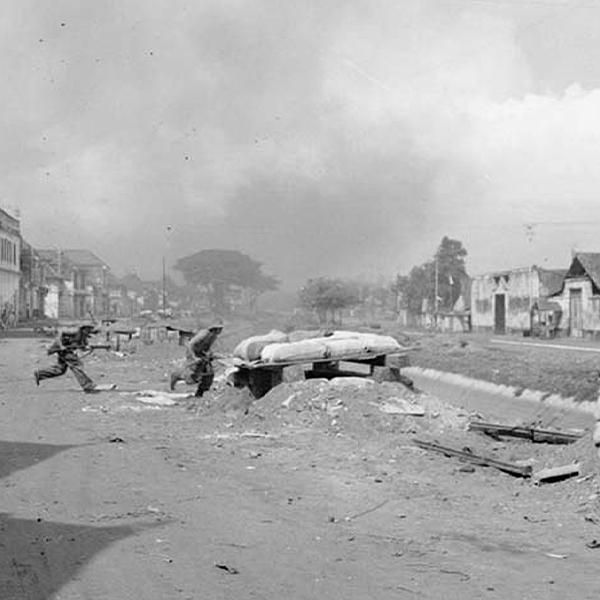
Photo: IWM
Jakarta was still smothered in darkness that morning. From a big house in East Pegangsaan, suddenly the telephone rang loudly. Tukimin, President Sukarno's bodyguard, rushed to pick up the phone. A few seconds later, he stepped into Bung Karno's room. He knocked on his superior's door carefully.
"Yeah. What's wrong?" Sukarno answered while holding back sleep.
"The adjutant of the British Army Commander, Sir. He said it was very important. I told him that you were sleeping, but he insisted that you be woken up," said Tukimin.
Sukarno immediately left the room. He then picked up the phone, conversing in a serious tone. Half an hour later, he returned to his room. With a sigh, the president turned to his wife Fatmawati.
"I will go to Surabaya by a British army plane tomorrow," he said as quoted in his autobiography, Bung Karno Penjambung Lidah Rakjat Indonesia (compiled by Cindy Adams).
As time went by, the fighting between Indonesian fighters and British troops in Surabaya was getting fiercer. Instead of taking control of the city, the positions of the soldiers of the 49th Brigade led by Brigadier A.W.S. Mallaby was even more squeezed. According to historian Frank Palmos, the British troops remaining in the center of the city were few and far between. One by one, they were ambushed and slaughtered.
"They ran out of logistics and ammunition..." said historian Frank Palmos in Surabaya 1945, Sacred Land.
Mallaby himself was in a dilemma. Although very aware of the difficulty of getting additional troops, he still sent messages asking for help. His request was, of course, rejected considering the fierce battles also that took place in several cities in Java. Meanwhile the closest concentration of British troops was in Singapore. That made, technically, military assistance cannot be brought to Surabaya quickly. Paratroopers were not a solution as well because the fighting had spread to all corners of Surabaya.
Commander of the Allied Forces for Southeast Asia Lieutenant General Sir Philip Christison who was asked for help was also in a state of confusion. In the end he had to forget his 'promise' to the Dutch not to have any contact with Sukarno at all. So when he learned that his subordinates were in a tight position on October 28, 1945, Christison called on the radio for a ceasefire. A reality that Falmos describes as a form of 'the despair of a British general'.
"Time was ticking... I had to disobey the order not to have anything to do with President Sukarno," he said, as quoted by Falmos from Christison's autobiography, Life and Times.
A few minutes after Mallaby's call, Christison immediately asked his aide to connect him directly with Sukarno in East Pegangsaan. To the president of the Republic of Indonesia, he asked him to be personally responsible for all the outrages that had occurred. Christison also asked Sukarno to come to calm his followers in Surabaya.
"Just wave the white flag before you land in Surabaya. I don't want your plane to be fired upon from below," he said.
According to Des Alwi, a military solution was deadlocked for Britain. The only way to save the remaining troops was a political settlement. A report from British military intelligence that was intercepted by the Indonesians implied their despair about the situation in Surabaya:
"If there is no immediate political settlement, in the next few hours we will be forced to surrender," the report was quoted by Des Alwi in his book, Battle of Surabaya, November 1945.